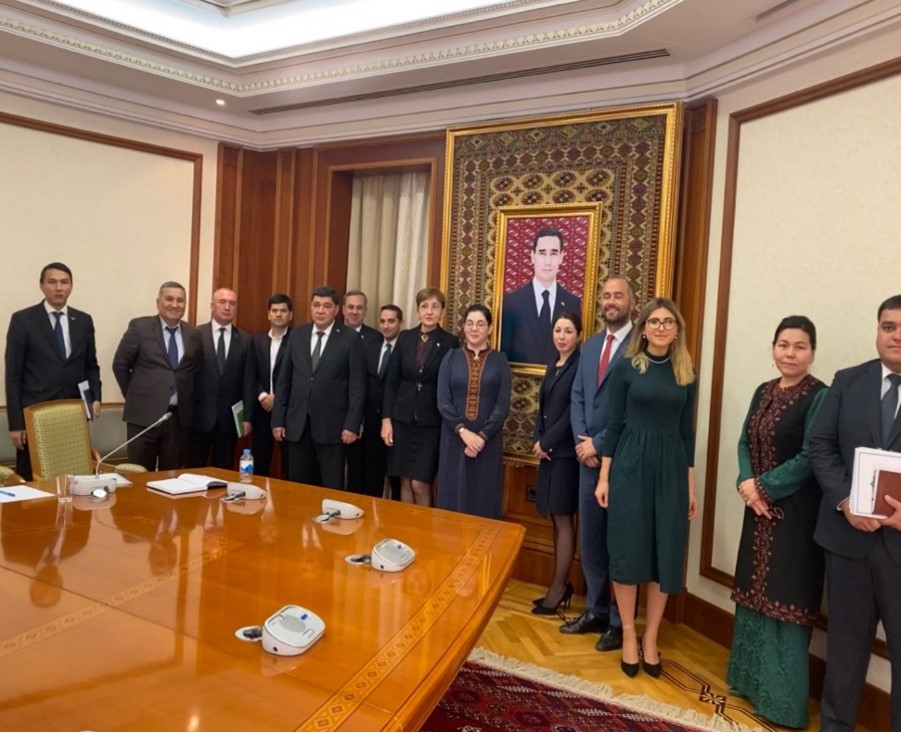During its recent mission in Turkmenistan, a delegation of the UNECE Economic Cooperation and Trade Division (ECTD) presented a proposal for a new analytical project – “Trade and Innovation for Sustainable Development of Turkmenistan” – to the government and international stakeholders, aimed at supporting the country to enhance innovation governance and remove barriers to trade.
The mission took place in response to the request of the Government of Turkmenistan to receive capacity-building assistance at meetings of the 2022 UNECE Executive Committee and Steering Committee on Trade Capacity and Standards (SCTCS). It comes at a crucial point for Turkmenistan’s development. In recent years, Turkmenistan saw consistent economic growth, reaching the status of an upper-middle-income country. Building upon this, the government has made significant steps to increase trade and access to new foreign markets. This includes, most notably, initiating the accession to the World Trade Organisation (WTO) on 25 November 2021, an essential step in Turkmenistan’s journey towards integrating into the global trading system.
Further expansion of Turkmenistan’s trade potential lies in enhancing the country’s export competitiveness, fostering innovation, diversifying export opportunities, building trade and logistics infrastructure, attracting foreign direct investment (FDI), and strengthening cooperation with international organisations. These objectives are also in line with the socio-economic development strategies of Turkmenistan for 2022-2028 and 2022-2052. Increasing exports and bolstering the country’s industrial capacities will play a key role its economic and social development and improve the effectiveness of natural resource use. In this regard, UNECE’s expertise could contribute to the country’s transition, giving a powerful boost to Turkmenistan’s sustainable development.
A new analytical tool to leverage synergies in UNECE’s work
UNECE will make use of the powerful synergies across ECTD work streams to deliver holistic analytical support to Turkmenistan. On the domestic level, the joint review will provide concrete and actionable recommendations on supporting export diversification through innovation or the development of new products or services. On the international and regional levels, UNECE will support the country in removing trade barriers and opening up new markets for these products through action-oriented recommendations contributing to the country’s WTO accession process.
Addressing these two dimensions of export capacity together provides an opportunity to create long-term sustainable change. Not only would UNECE’s support to Turkmenistan facilitate cross-border trade, but it would also allow the country to develop new and unique products for export. The project will also make use of other UNECE tools as part of inter-governmental work under the Steering Committee on Trade Capacity and Standards, the Committee on Innovation, Competitiveness and Public-Private Partnerships and the United Nations Centre for Trade Facilitation and Electronic Business (UN/CEFACT). It will also consider the tools under the United Nations Special Programme for the Economies of Central Asia (SPECA).
Engaging a wide variety of high-level stakeholders
During the mission, the UNECE delegation met with various government stakeholders to assess the needs and priorities of Turkmenistan as it embarks on the path of WTO accession.
Discussions with more than 30 government stakeholders confirmed the relevance of UNECE’s project to the ongoing developments in Turkmenistan. UNECE’s expertise in the areas of trade and innovation in the context of analytical work under Innovation for Sustainable Development Review (I4SDR) and Studies on Regulatory and Procedural Barriers to Trade (RPBT) will contribute to Turkmenistan’s efforts to integrate into the multilateral trading system, support entrepreneurship and export diversification.
The UNECE delegation also held several meetings with embassies and international organisations to discuss their ongoing initiatives in the country and seek synergies under the new initiative. It met with representatives of the Asian Development Bank (ADB), U.S. Agency for International Development (USAID), Türkiye, and the International Trade Center (ITC), as well as the United Nations Resident Coordinator and colleagues from the United Nations Development Programme (UNDP). International stakeholders confirmed the current gap in analytical work on innovation and trade in Turkmenistan and the need for capacity-building, which is also as part of the WTO accession process. ///UNECE, 1 Dec 2022
